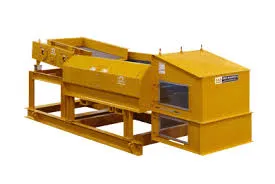

11-р сар . 08, 2024 19:49 Back to list
The Importance of Scrap Metal Recycling Plants
In the age of environmental consciousness and sustainable development, scrap metal recycling plants play a crucial role in minimizing waste and conserving resources. As industrialization continues to grow, so does the need for effective recycling methods to ensure that valuable materials are reused rather than thrown away. This article explores the significance of scrap metal recycling plants, their processes, and their environmental impact.
Understanding Scrap Metal Recycling
Scrap metal recycling involves collecting and processing metal waste to be reused in the manufacturing of new products. Metals, such as steel, aluminum, copper, and brass, are among the most recycled materials in the world. These materials are used extensively in industries such as construction, transportation, and electronics. The recycling process not only conserves natural resources but also significantly reduces energy consumption and greenhouse gas emissions compared to the production of new metals from raw materials.
The Role of Scrap Metal Recycling Plants
Scrap metal recycling plants serve as the hub for collecting, sorting, and processing scrap metals. These facilities are equipped with advanced technology to handle various types of metals efficiently. The process begins with the collection of scrap metal from various sources, including industrial manufacturers, construction sites, and even households. Once collected, the metal is sorted based on its type and grade.
Sorting is crucial because different metals require different processing methods. For example, aluminum is typically processed separately from steel due to its unique melting point and properties. After sorting, the metals undergo shredding to reduce their size, making them easier to transport and process. The shredded metal is then compacted into bales or pellets for further processing.
Processing Methods
The primary method of recycling metals at these plants involves melting the sorted and shredded scrap. Different metals are melted at different temperatures using large furnaces. Once melted, the liquid metal can be poured into molds to form ingots, which can be used to manufacture new products. This process is not only energy-efficient but also integrates the use of recycled materials into the production cycle.

Moreover, scrap metal recycling plants take considerable measures to ensure that the recycling process is safe and environmentally friendly. Efforts are made to handle hazardous materials properly, and steps are taken to minimize emissions during melting. Advanced filtration systems and pollution control measures are implemented to protect air quality and reduce the environmental footprint of recycling operations.
Environmental Benefits
The benefits of scrap metal recycling extend beyond just resource recovery. By recycling metals, we can significantly reduce the need for mining and extraction, which often leads to habitat destruction, soil and water pollution, and increased carbon emissions. According to the Environmental Protection Agency (EPA), recycling one ton of steel can save 2,500 pounds of iron ore, 1,400 pounds of coal, and 120 pounds of limestone.
Additionally, recycling metals conserves energy. The energy required to recycle metals is generally lower than that needed to produce metals from virgin ore. For instance, recycling aluminum can save up to 95% of the energy required for primary aluminum production. This energy savings translates into fewer fossil fuels being burned, further mitigating climate change.
Economic Impact
Scrap metal recycling plants also contribute positively to the economy. They create jobs in various sectors, including collection, processing, and transportation of scrap metal. Moreover, the recycling industry stimulates economic activity by providing raw materials to manufacturers at a lower cost than newly mined minerals, which can lead to lower prices for consumers.
Conclusion
In summary, scrap metal recycling plants are essential to fostering a circular economy, promoting environmental sustainability, and driving economic growth. They serve as a vital link in reclaiming valuable materials while reducing the burden on our planet's resources. By supporting and promoting recycling initiatives, we can contribute to a more sustainable future for generations to come, highlighting the critical importance of incorporating recycling practices into our everyday lives.
Latest news
Troubleshooting Common Eddy Separator Problems
NewsJul.04,2025
The Role of Metal Recycling Plants in Circular Economy
NewsJul.04,2025
The Impact of Recycling Line Pickers on Waste Management Costs
NewsJul.04,2025
Safety Features Every Metal Shredder Should Have
NewsJul.04,2025
How Industrial Shredders Improve Waste Management Systems
NewsJul.04,2025
How Cable Granulators Contribute to Sustainable Recycling
NewsJul.04,2025